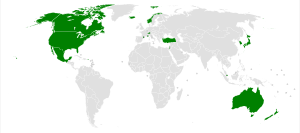JUSCANZ facts for kids
The JUSCANZ Group is a special team of countries that work together. They share information at the United Nations. The United Nations is a big organization where countries talk about world issues.
JUSCANZ helps countries share ideas at places like the UN Human Rights Council. It also works with other UN groups. These include the Third and Fourth Committees of the United Nations General Assembly.
The name JUSCANZ comes from its first members. These were Japan, the United States, Canada, Australia, and New Zealand. This group is part of a larger UN group called the Western European and Others Group (WEOG). JUSCANZ helps balance the influence of the European Union within WEOG.
How JUSCANZ Works
The main job of the JUSCANZ Group is to share information. It is not like other UN groups that try to agree on policies. Members of JUSCANZ do not have to agree on everything.
Instead, they meet to talk about new ideas or plans. They share updates on different resolutions. They also point out any possible problems for other countries. This helps everyone stay informed.
Who are the Members?
The countries in the JUSCANZ Group can change. The main members who have joined meetings include:
 Andorra
Andorra Australia
Australia Canada
Canada Iceland
Iceland Israel
Israel Japan
Japan South Korea
South Korea Liechtenstein
Liechtenstein Mexico
Mexico Monaco
Monaco New Zealand
New Zealand Norway
Norway Singapore
Singapore Switzerland
Switzerland Turkey
Turkey United Kingdom
United Kingdom United States
United States
A Brief History
On January 22, 2010, Israel was allowed to join JUSCANZ meetings. This was for sessions held at the United Nations Office at Geneva. However, Israel could not join meetings at the main UN Headquarters in New York. They also could not join in Vienna or Nairobi.
Later, on February 11, 2014, Israel was allowed to join JUSCANZ. This included all relevant UN Committees in New York.
See also
- CANZUK
- JACKSNNZ
- Umbrella Group
- Western European and Others Group
 | Misty Copeland |
 | Raven Wilkinson |
 | Debra Austin |
 | Aesha Ash |


